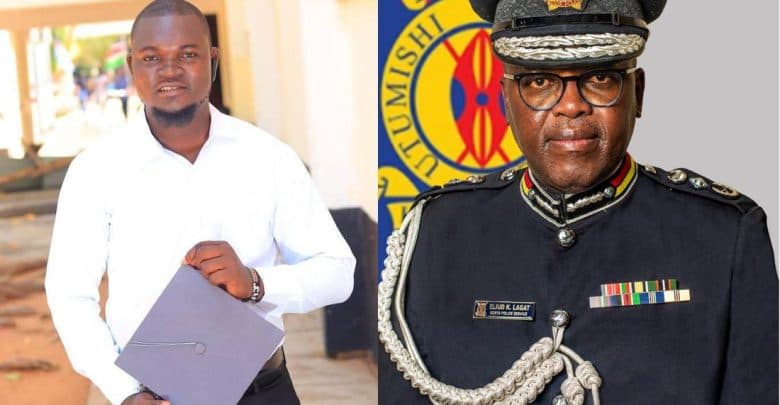We're loading the full news article for you. This includes the article content, images, author information, and related articles.
The investigation into the shocking murder of blogger Albert Ojwang has taken a significant turn, with a Nairobi court ordering Police Constable James Mukhwana to remain in custody until June 20.

Nairobi, Kenya — June 13, 2025
A Nairobi courtroom became the epicenter of public scrutiny and rising national tension on Thursday as Police Constable James Mukhwana was formally remanded until June 20 in connection with the controversial death of blogger and educator Albert Ojwang. The ruling, delivered by a city magistrate amid a tightly packed courtroom and visible public interest, marks a pivotal milestone in a case that has ignited outrage, protests, and renewed demands for accountability within Kenya’s law enforcement institutions.
The court sided with the Independent Policing Oversight Authority (IPOA), which had strongly petitioned for a 21-day custodial detention to allow for critical forensic investigations, including analysis of digital communications and surveillance footage allegedly erased or tampered with.
IPOA’s legal counsel argued that releasing Mukhwana — the primary suspect in the fatal beating of Ojwang inside Nairobi’s Central Police Station — would pose an imminent threat to the integrity of the investigation. They warned of potential witness intimidation, tampering with remaining evidence, and internal interference from other officers possibly implicated in the incident.
“We are not merely investigating one rogue officer,” an IPOA lawyer told the court. “We are peeling back layers of a possible institutional cover-up.”
The magistrate concurred, stating that the circumstances surrounding Ojwang’s death were serious enough to warrant continued detention while investigations proceed.
Ojwang, widely respected for his bold online commentary on governance and police conduct, was arrested earlier this month under murky circumstances. He was found dead less than 48 hours later while in custody. Initial medical reports suggest he died from internal injuries consistent with blunt force trauma, further fueling suspicions of police brutality.
The case has since evolved from a singular tragedy to a national flashpoint. Massive protests erupted across Nairobi on June 12, culminating in violent clashes between demonstrators and police, two cars torched in the city center, and widespread disruption of business in the capital.
Chants of “No justice, no peace” and “Justice for Albert” have reverberated through the streets, underscoring public anger not only at Ojwang’s death, but at a justice system long perceived as shielding law enforcement from consequences.
Adding to the gravity of the case are IPOA’s allegations of an organized attempt to obscure the truth. Key CCTV footage from the police station is reportedly missing or erased, and IPOA investigators have flagged gaps in arrest records and internal duty logs.
Sources within the oversight authority suggest that additional officers could be questioned or arrested in the coming days, as forensic analysis of seized mobile phones and digital correspondence continues. The full autopsy report, expected within a week, is also anticipated to be a crucial piece of evidence.
As Mukhwana remains in custody, the country watches closely, its faith in justice hanging in the balance. Civil society groups, legal observers, and human rights advocates have called the court’s decision a step in the right direction — but insist that transparency, independence, and courage must guide the investigation to its conclusion.
“This is not just about one officer,” said a spokesperson for the Kenya Human Rights Commission. “This is about whether Kenya is serious about ending police impunity.”
For the family of Albert Ojwang, the ruling offers a glimmer of hope in a process they describe as painful and surreal.
“We will not rest until we know the truth,” said a relative outside the courthouse. “Albert believed in justice. He must not die in vain.”
As the investigation intensifies, all eyes will be on IPOA’s next move and whether further arrests follow. Meanwhile, national pressure is mounting on both the Office of the Director of Public Prosecutions (ODPP) and Inspector General of Police Japhet Koome to ensure that justice is not only done — but seen to be done.
The next court date, June 20, could prove critical in determining the direction of the case — and whether this tragedy becomes a turning point in Kenya’s long battle against police abuse and impunity.
Keep the conversation in one place—threads here stay linked to the story and in the forums.
Sign in to start a discussion
Start a conversation about this story and keep it linked here.
Other hot threads
E-sports and Gaming Community in Kenya
Active 9 months ago
The Role of Technology in Modern Agriculture (AgriTech)
Active 9 months ago
Popular Recreational Activities Across Counties
Active 9 months ago
Investing in Youth Sports Development Programs
Active 9 months ago